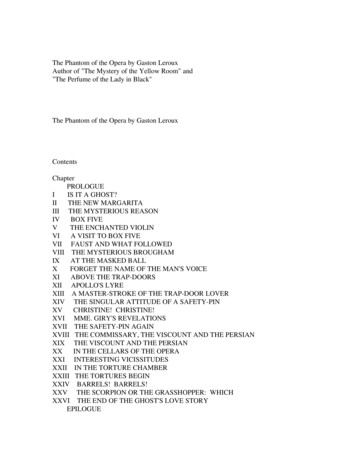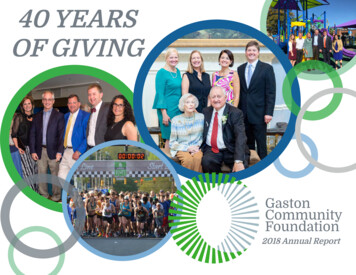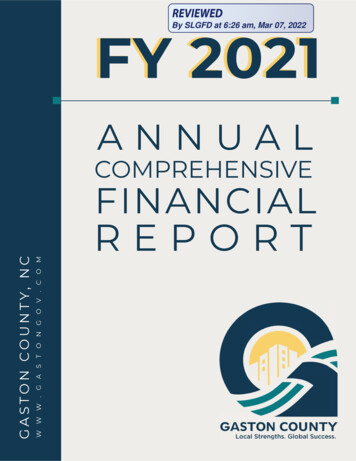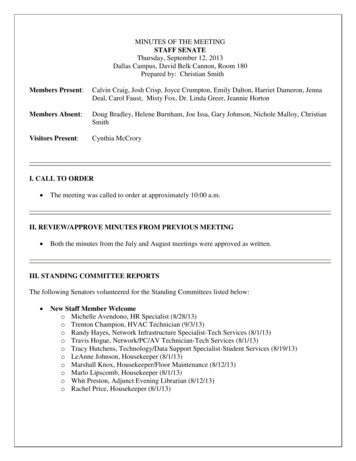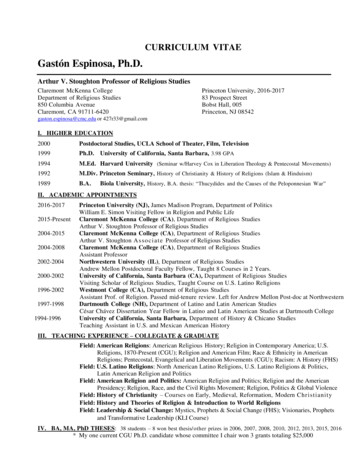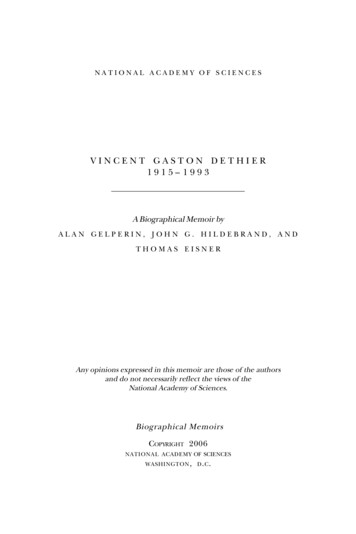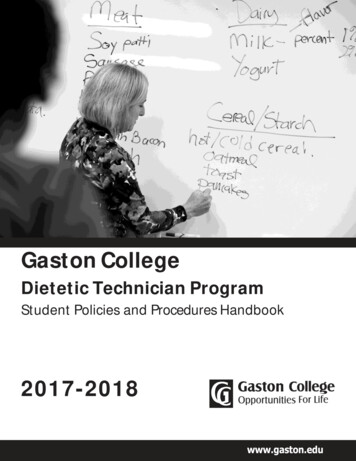
Transcription
Gaston CollegeDietetic Technician ProgramStudent Policies and Procedures Handbook2017-2018
GASTON COLLEGEDIETETIC TECHNICIAN PROGRAMSTUDENTPOLICIES AND PROCEDURESHANDBOOK2017-2018These policies are in addition to the current Gaston CollegeStudent Handbook and Catalog
Table of ContentsGENERAL INFORMATION . 4Gaston College Mission Statement . 5Accreditation and Memberships . 5Dietetic Technician Program Mission Statement . 6Accreditation Status . 6Dietetic Technician Program Goals . 6CORE KNOWLEDGE & COMPETENCIES FOR THE NUTRITION and DIETETICSTECHNICIAN PROGRAM . 7CODE OF ETHICS FOR THE DIETEIC PRACTITIONER PREAMBLE . 11PRINCIPLES . 11CURRICULUM DESCRIPTION . 15ADMISSION INFORMATION. 15POLICIES RELATED TO ADMISSION INTO THE DIETETIC TECHNICIAN PROGRAM 17READMISSION POLICIES AND PROCEDURES . 20REQUIREMENTS OF COMPLETION OF THE DIETETIC TECHNICIAN PROGRAM:. 22GRADUATION AND PROGRAM COMPLETION REQUIREMENTS: . 22VERIFICATION OF SUCCESSFUL COMPLETION . 24STUDENT PERSISTENCE AND SUCCESS PLANS . 24REVIEW OF STUDENT PROGRESS . 33DIETETIC TECHNICIAN PROGRAM POLICIES . 35NOTICE OF ACCOMMODATIONS FOR RELIGIOUS OBSERVANCES. 42ELECTRONIC COMMUNICATION DEVICES . 43TOBACCO-FREE CAMPUS. 43CAMPUS SAFETY ANNOUNCEMENT . 44COUNSELING AND CAREER DEVELOPMENT CENTER . 44FINANCIAL AID. 44
GASTON COLLEGEDIETETIC TECHNICIAN PROGRAMGENERAL INFORMATIONGaston College is one of 58 community colleges in the North Carolina CommunityCollege System. In January 1963, the college was granted a charter by the State ofNorth Carolina and began its first classes in temporary headquarters in September1964. The college moved to its permanent campus on Highway 321 between Dallasand Gastonia two months later. The first commencement ceremony was held on May31, 1965. Serving both Gaston and Lincoln counties, Gaston College enrolls over 6,000students each term in curriculum programs and averages over 16,000 studentsannually in its Economic and Workforce Development/Continuing Education programs.Gaston College is accredited by the Southern Association of Colleges and SchoolsCommission on Colleges to award associate degrees.The fourteen major buildings that comprise the main campus of Gaston College (DallasCampus) contain approximately 535,753 square feet. There is an efficient road systemand parking for more than 2,000 cars. College facilities (including a 700 maximumcapacity multi-purpose auditorium) are available for public use and may be scheduledthrough the Finance, Facilities and Operations Division. The estimated insurance valuefor the entire campus (all three campuses) is approximately 115,000,000.The Lincoln Campus of Gaston College was opened in August 1969. It moved to theLincoln County School of Technology at 1 Timken Drive in Lincolnton in 1987. Thecollege renovated the former Lincolnton High School at 511 S. Aspen Street which isthe new Lincoln Campus. Beginning spring semester 1999, classes were held at thenew Lincoln Campus. The Lincoln Campus was granted Campus status in semesterMarch 2000 and is currently referred to as the Lincoln Campus of Gaston College.Today, the Lincoln Campus features two major buildings-one constructed as recentlyas 2008.Gaston College added a third campus in 2005 The Kimbrell Campus, located inBelmont, North Carolina, currently comprises a modern classroom building and theNorth Carolina Technology Center. This Center is the only one of its kind in NorthCarolina and provides specialized testing and training for the textile industry.The Gaston College Dietetic Technician Program planning began in the summer of 1997.The Dean of Health Education at Gaston College conducted an informal survey oftwenty-four health care providers in Gaston and Lincoln Counties. The number onerecommendation for new program development was massage therapy and the numbertwo was dietetic technician. Providers based their recommendation on the increasinguse of nutrition in the promotion of health and support of disease states. It wasrecognized that no programs existed in the community college system. The providers4Revised August 2017
and potential employers determined these programs are future oriented and thedevelopment of them would be proactive for the community college system.The use of Distance Education was new to the North Carolina Community CollegeSystem when the program was being planned. It has been used to implement theDietetic Technician program at Gaston College based on the Distance EducationProgram at Central Arizona College (CAC) which has been in existence for overtwenty years. CAC is part of the Arizona Community College System. The CACprogram is accredited by the Academy of Nutrition and Dietetics.Following the notification of intent to develop a Dietetic Technician program, twocolleges emerged as ready to seek approval: Gaston College and Lenoir CommunityCollege. Gaston and Lenoir received approval from the North Carolina CommunityCollege System (NCCCS) to begin their programs in January 1999. The first studentswere enrolled in the Gaston College Program Fall Semester 1999. Lenoir CommunityCollege has since closed its Dietetic Technician Program, leaving Gaston College as theonly program in North Carolina. In August 2015, Gaston College will implement a LevelThree Instructional Service Agreement with Lenoir Community College that will reservespace for their students in the Gaston College Dietetic Technician Program.The Dietetic Technician courses are taught online as distance education via theInternet. Distance students are expected to take the related classes at a communitycollege near them. The Dietetic Technician courses will be taken under the supervisionof the Program Department Chair at Gaston College and a college qualified, approvedpreceptor in their home community. Local students have the option of completingsupervised practice experiences under campus instructors. Attendance by distancestudents on the Gaston College Campus is minimal, if at all. Local students who chooseto complete their supervised practice under Gaston College are required to attend thesupervised practice set by the Department Chair of the Dietetic Technician Program andfaculty.Gaston College Mission StatementGaston College is an open-door public community college, located in Gaston andLincoln counties, that promotes student success and access to lifelong learningthrough high-quality, flexible, affordable, and comprehensive education programsand services responding to economic and workforce development needs.Accreditation and MembershipsGaston College is accredited by the Commission on Colleges of the SouthernAssociation of Colleges and Schools to award associate degrees. Contact theCommission on Colleges at 1866 Southern Lane, Decatur, Georgia 30033-4097 orcall 404-679-4500 for questions about the accreditation of Gaston College.The Commission on Colleges should be contacted only on matters related to theaccreditation status of Gaston College and not for general college information.5Revised August 2017
Dietetic Technician Program Mission StatementThe mission of the Dietetic Technician Program is to prepare and develop entry levelgraduates as life-long learners and competent practitioners in diverse community,health and business environments.Accreditation StatusThe Dietetic Technician Program at Gaston College received initial accreditation fromthe Accreditation Council for Education in Nutrition and Dietetics (ACEND) on April 6,2006 with continued full accreditation on August 12, 2016. ACEND is the credentialingagency for the Academy of Nutrition & Dietetic (AND). For more information pleasecontact:Accreditation Council for Education in Nutrition and DieteticsAcademy of Nutrition & Dietetics120 South Riverside Plaza, Suite 2000Chicago, Illinois 60606-6995Dietetic Technician Program GoalsProgram Goal 1: Prepare program graduates to become entry level dietetictechnician practitioners.1. Objectives to assess achievement of this goal:a. 50% of program graduates are expected to take the CDR credentialingexam for nutrition and dietetics technicians within 12 months of programcompletion.b. 70% of graduates, over a five year period, will successfully pass the CDRcredentialing exam for nutrition and dietetics technicians within one yearfollowing the first attempt.c. 80% of employers will rate new program graduates on a Likert scale of one tofive as prepared in knowledge, skills and professionalism for their entry levelposition.d. 80% of students admitted to the program will complete the program within3.5 years (or 150% of the length of the program) of declaring their major inthe dietetic technician program.e. 80% of graduates will be expected to be employed in nutrition anddietetics or a related field within 12 months of graduation.Data for each variable will be collected separately.6Revised August 2017
Program Goal 2: Graduate dietetic technician professionals who will engage as lifelonglearners.1. Objectives to assess achievement of this goal:a. 80% of credentialed nutrition and dietetics technician graduates will maintaintheir credentialed status within five years after graduation.b. At least one graduate will be enrolled in a nutrition, dietetics or a healthrelated academic program to further his/her education within 12 months ofgraduation.CORE KNOWLEDGE & COMPETENCIES FOR THE NUTRITION and DIETETICSTECHNICIAN PROGRAMThe program’s curriculum must prepare students with the following core knowledgeand competencies:1. Domain 1. Scientific and Evidence Base of Practice: Integration ofscientific information and translation of research into practice.KnowledgeUpon completion of the program, graduates are able to:KNDT 1.1Demonstrate how to locate, interpret, evaluate and useprofessional literature to make ethical, evidence-based practicedecisions related to the dietetics technician level of practice.KNDT 1.2Use current information technologies to locate and applyevidence-based guidelines and protocols.KNDT 1.3Apply critical thinking skills.CompetenciesUpon completion of the program, graduates are able to:CNDT 1.1Access data, references, patient education materials, consumerand other information from credible sources.CNDT 1.2Evaluate information to determine if it is consistent withaccepted scientific evidence.CNDT 1.3Collect performance improvement, financial, productivity oroutcomes data and compare it to established criteria.CNDT 1.4Implement actins based on care plans, protocols, policies, andevidence-based practice.7Revised August 2017
2. Domain 2. Professional Practice Expectations: Beliefs, values,attitudes and behaviors for the professional nutrition and dieteticstechnician level of practice.Knowledge:Upon completion of the program, graduates are able to:KNDT 2.1Demonstrate effective and professional oral and writtencommunication skills sufficient for entry into technical practice.KNDT 2.2Demonstrate effective interviewing and educationmethods for diverse individual and groups.KNDT 2.3Describe the governance of nutrition and dietetics practice,such as the Scope of Nutrition and Dietetics Practice and theCode of Ethics for the Profession of Nutrition and Dietetics; andinterprofessional relationships in various practice settings.KNDT 2.4Identify and describe the work of interprofessional teams andthe roles of others with whom the nutrition and dieteticstechnician, registered collaborates in the delivery of food andnutrition services.KNDT 2.5Demonstrate an understanding of cultural competence/sensitivity.KNDT 2.6Explain legislative and regulatory policies related to nutritionand dietetics technician level of practice.KNDT 2.7Demonstrate identification with the nutrition and dieteticsprofession through activities such as participation inprofessional organizations and defending a position on issuesimpacting the nutrition and dietetics profession.KNDT 2.8Demonstrate an understanding of the importance andexpectations of a professional in mentoring and preceptingothers.CompetenciesUpon completion of the program, graduates are able to:CNDT 2.1Adhere to current federal regulations and state statutes andrules, as applicable and in accordance with accreditationstandards and the Scope of Dietetics Practice, Standards ofProfessional Practice and the Code of Ethics for the Professionof Dietetics.CNDT 2.2Use clear and effective oral and written communication.CNDT 2.3Prepare and deliver sound food and nutrition presentations to atarget audience.CNDT 2.4Demonstrate active participation, teamwork and contributionsin group settings.CNDT 2.5Function as a member of interprofessional teams.CNDT 2.6Refer situations outside the nutrition and dietetics technicianscope of practice or area of competence to a registereddietitian nutritionist or other professional.8Revised August 2017
CNDT 2.7CNDT 2.8CNDT 2.9CNDT 2.10CNDT 2.11CNDT 2.12CNDT 2.13Participate in professional and community organizations.Demonstrate professional attributes in all areas of practice.Show cultural competence in interactions with clients,colleagues and staff.Perform self-assessment and develop goals for selfimprovement throughout the program.Prepare a plan for professional development according toCommission on Dietetic Registration guidelines.Participate in advocacy on local, state or national legislative andregulatory issues or policies impacting the nutrition anddietetics profession.Practice and/or role play mentoring and precepting others.3. Domain 3. Clinical and Customer Services: Development anddelivery of information, products and services to individuals, groupsand populations.KnowledgeUpon completion of the program, graduates are able to:KNDT 3.1Use the Nutrition Care Process for nutrition screening forreferral to the registered dietitian nutritionist, collection ofassessment data, nutrition interventions and monitoringstrategies appropriate for the technician level of practice.KNDT 3.2Implement interventions to effect change and enhancewellness in diverse individuals and groups.KNDT 3.3Present an educational session to a target papulation.KNDT 3.4Describe the processes involved in delivering quality food andnutrition services.CompetenciesUpon completion of the program, graduates are able to:CNDT 3.1Perform nutrition screening and identify clients or patients tobe referred to a registered dietitian nutritionist.CNDT 3.2Perform specific activities of the Nutrition Care Process asassigned by registered dietitian nutritionists in accordance withthe Scope of Nutrition and Dietetics Practice for individuals,groups and populations in a variety of settings.CNDT 3.3Provide nutrition and lifestyle education to well populations.CNDT 3.4Promote health improvement, food safety, wellness and diseaseprevention for the general population.CNDT 3.5Develop nutrition education materials for disease preventionand health improvement that are culturally and age appropriateand designed for the literacy level of the audience.CNDT 3.6Perform supervisory functions for purchasing, production andservice of food that meets nutrition guidelines, cost parametersand health needs.9Revised August 2017
CNDT 3.7Modify recipes and menus for acceptability and affordabilitythat accommodate the cultural diversity and health status ofvarious populations, groups and individuals.4. Domain 4. Practice Management and Use of Resources: Strategicapplication of principles of management and systems in theprovision of services to individuals and organizations.KnowledgeUpon completion of the program, graduates are able to:CNDT 4.1Participate in quality improvement and customer satisfactionactivities to improve delivery of nutrition services.CNDT 4.2Perform supervisory, education and training functions.CNDT 4.3Use current nutrition informatics technology to develop, store,retrieve and disseminate information and data.CNDT 4.4Participate in development of a plan for a new service includingbudget.CNDT 4.5Implement and adhere to budgets.CNDT 4.6Assist with marketing clinical and customer services.CNDT 4.7Propose and use procedures as appropriate to the practicesetting to promote sustainability, reduce waste and protect theenvironment.5.3 The program’s curriculum must provide learning activities to attain thebreadth and depth of the required curriculum components and core knowledgeand competencies. Syllabi for courses taught within the academic unit andsupervised practice rotation descriptions must include these learning activitieswith the associated KNDT/CNDT.a. Learning activities must prepare students for technical practice withpatients/clients with various conditions.b. Leaning activities must prepare students to implement selected componentsof the Nutrition Care Process under the supervision of the registered dietitiannutritionist with various populations and diverse cultures, including infants,children, adolescents, adults, pregnant/lactating females, and older adults.c. Learning activities must use a variety of educational approaches necessaryfor delivery of curriculum content, to meet learner needs and to facilitate learningobjectives.10Revised August 2017
CODE OF ETHICS FOR THE DIETEIC PRACTITIONERPREAMBLEThe Academy of Nutrition and Dietetics (AND) and its credentialing agency, theCommission on Dietetic Registration (CDR), believe it is in the best interest of theprofession and the public it serves to have a Code of Ethics in place that providesguidance to dietetics practitioners in their professional practice and conduct. Dieteticspractitioners have voluntarily adopted this Code of Ethics to reflect the values andethical principles guiding the dietetics profession and to set forth commitments andobligations of the dietetics practitioner to the public, clients, the profession,colleagues, and other professionals. The current Code of Ethics was approved in May2009 by the AND Board of Directors, House of Delegates, and the Commission onDietetic Registration.PRINCIPLESFundamental Principles1. The dietetics practitioner conducts himself/herself with honesty, integrity,and fairness.2. The dietetics practitioner supports and promotes high standards ofprofessional practice. The dietetics practitioner accepts the obligation toprotect clients, the public, and the profession by upholding the Code ofEthics for the Profession of Dietetics and by reporting perceived violationsof the Code through the processes established by AND and its credentialingagency, CDR.Responsibilities to the Public3. The dietetics practitioner considers the health, safety, and welfare of thepublic at all times.The dietetics practitioner will report inappropriate behavior or treatment ofa client by another dietetics practitioner or other professionals.4. The dietetics practitioner complies with all laws and regulationsapplicable or related to the profession or to the practitioner’s ethicalobligations as described in this Code.a. The dietetics practitioner must not be convicted of a crime under thelaws of the United States, whether a felony or a misdemeanor, anessential element of which is dishonesty. The dietetics practitionermust not be disciplined by a state for conduct that would violateone or more of these principles.b. The dietetics practitioner must not be disciplined by a state forconduct that would violate one or more of these principles.11Revised August 2017
c. The dietetics practitioner must not commit an act of misfeasance ormalfeasance that is directly related to the practice of the professionas determined by a court of competent jurisdiction, a licensingboard, or an agency of a government body.5. The dietetics practitioner provides professional services with objectivityand with respect for the unique needs and values of individuals.a. The dietetics practitioner does not, in professional practice,discriminate against others on the basis of race, ethnicity, creed,religion, disability, gender, age, gender identity, sexual orientation,national origin, economic status, or any other legally protectedcategory.b. The dietetics practitioner provides services in a manner that issensitive to cultural differences.c. The dietetics practitioner does not engage in sexual harassment inconnection with professional practice.6. The dietetics practitioner does not engage in false or misleading practicesor communications.a. The dietetics practitioner does not engage in false or deceptiveadvertising of his or her services.b. The dietetics practitioner promotes or endorses specific goods orproducts only in a manner that is not false and misleading.c. The dietetics practitioner provides accurate and truthful informationin communicating with the public.7. The dietetics practitioner withdraws from professional practice whenunable to fulfill his or her professional duties and responsibilities to clientsand others.a. The dietetics practitioner withdraws from practice when he/she hasengaged in abuse of a substance such that it could affect his or herpractice.b. The dietetics practitioner ceases practice when he or she has beenadjudged by a court to be mentally incompetent.c. The dietetics practitioner will not engage in practice when he or shehas a condition that substantially impairs his or her ability to provideeffective service to others.Responsibilities to Clients8. The dietetics practitioner recognizes and exercises professional judgmentwithin the limits of his or her qualifications and collaborates with others,seeks counsel, or makes referrals as appropriate.12Revised August 2017
9. The dietetics practitioner treats clients and patients with respect andconsideration.a. The dietetics practitioner provides sufficient information to enableclients and others to make their own informed decisions.b. The dietetics practitioner respects the client’s right to makedecisions regarding the recommended plan of care, includingconsent, modification, or refusal.10. The dietetics practitioner protects confidential information and makes fulldisclosure about any limitations on his or her ability to guarantee fullconfidentiality.11. The dietetics practitioner, in dealing with and providing services to clientsand others, complies with the same principles set forth above in“Responsibilities to the Public” (Principles #3-7).Responsibilities to the Profession12. The dietetics practitioner practice dietetics based on evidence- basedprinciples and current information.13. The dietetics practitioner presents reliable and substantiated informationand interprets controversial information without personal bias, recognizingthat legitimate differences of opinion exist.14. The dietetics practitioner assumes a life-long responsibility andaccountability for personal competence in practice, consistent withaccepted professional standards, continually striving to increaseprofessional knowledge and skills and to apply them in practice.15. The dietetics practitioner is alert to the occurrence of a real or potentialconflict of interest and takes appropriate action whenever a conflict arises.a. The dietetics practitioner makes full disclosure of any real orperceived conflict of interest.b. When a conflict of interest cannot be resolved by disclosure, thedietetics practitioner takes such other action as may be necessary toeliminate the conflict, including recusal from an office, position, orpractice situation.16. The dietetics practitioner permits the use of his or her name for thepurpose of certifying that dietetics services have been rendered only if heor she has provided or supervised the provision of those services.17. The dietetics practitioner accurately presents professional qualificationsand credentials.a. The dietetics practitioner, in seeking, maintaining, and usingcredentials provided by CDR, provides accurate information andcomplies with all requirements imposed by CDR. The dietetics13Revised August 2017
practitioner uses CDR-awarded credentials (“RD” or “RegisteredDietitian”; “DTR” or “Dietetic Technician, Registered”; “CS” or“Certified Specialist”; and “FAND” or “Fellow of the Academy ofNutrition and Dietetics”) only when the credential is current andauthorized by CDR.b. The dietetics practitioner does not aid any other person in violatingany CDR requirements, or in representing himself or herself as CDRcredentialed when he or she is not.18. The dietetics practitioner does not invite, accept, or offer gifts, monetaryincentives, or other considerations that affect or reasonably give anappearance of affecting his/her professional judgment.Clarification of Principle:a. Whether a gift, incentive, or other item of consideration shall beviewed to affect, or give the appearance of affecting, a dieteticspractitioner’s professional judgment is dependent on all factorsrelating to the transaction, including the amount or value of theconsideration, the likelihood that the practitioner’s judgment will oris intended to be affected, the position held by the practitioner, andwhether the consideration is offered or generally available topersons other than the practitioner.b. It shall not be a violation of this principle for a dietetics practitionerto accept compensation as a consultant or employee or as part of aresearch grant or corporate sponsorship program, provided therelationship is openly disclosed and the practitioner acts withintegrity in performing the services or responsibilities.c. This principle shall not preclude a dietetics practitioner fromaccepting gifts of nominal value, attendance at educationalprograms, meals in connection with educational exchanges ofinformation, free samples of products, or similar items, as long assuch items are not offered in exchange for or with the expectationof, and do not result in, conduct or services that are contrary to thepractitioner’s professional judgment.d. The test for appearance of impropriety is whether the conduct wouldcreate in reasonable minds a perception that the dieteticspractitioner’s ability to carry out professional responsibilities withintegrity, impartiality, and competence is impaired.14Revised August 2017
Responsibilities to Colleagues and Other Professionals19. The dietetics practitioner demonstrates respect for the values, rights,knowledge, and skills of colleagues and other professionals.a. The dietetics practitioner does not engage in dishonest, misleading,or inappropriate business practices that demonstrate a disregard forthe rights or interests of others.b. The dietetics practitioner provides objective evaluations ofperformance for employees and coworkers, candidates foremployment, students, professional association memberships,awards, or scholarships, making all reasonable efforts to avoid biasin the professional evaluation of others.CURRICULUM DESCRIPTIONThe Dietetic Technician Program prepares individuals to promote optimal healththrough proper nutrition by providing personalized services to meet client’s needs,and ensure balanced diets. Dietetic Technicians work independently as teammembers under the supervision of a licensed, registered dietitian (RD). Graduates ofthe Dietetic Technician Program are eligible to take the national registrationexamination for dietetic technicians.Course work includes content related to food and nutrition sciences, foodservicesystems management and a range of general science courses. The physical,biological, behavioral and social sciences support these areas.Employment opportunities include healthcare, business and industry, community andpublic health, foodservice, and research.ADMISSION INFORMATIONStudents applying for admission to the Gaston College Dietetic Technician ProgramMUST meet the following requirements for general admission to the college:1. Applicants must be at least 18 years old.2. Complete the General Admission Application to Gaston College.3. Complete a new student online orientation at www.gastoncollegeonline.com4. Complete an Application to the Dietetic Technician Program using the InternetExplorer web browser. At the signature box, please type your full name to certifythat all of the information on the application is correct.15Revised August 2017
5. Request that your high school mail an official high school transcrip
Program at Central Arizona College (CAC) which has been in existence for over twenty years. CAC is part of the Arizona Community College System. The CAC program is accredited by the Academy of Nutrition and Dietetics. Following the notification of intent to develop a Dietetic Technician program, two
